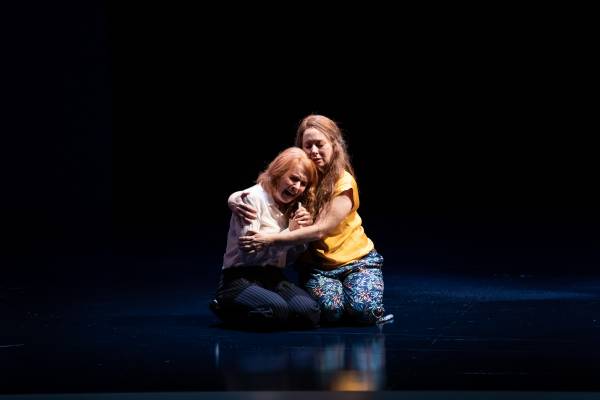Drama Theatre, April 12
7.5/10
With each play she comes closer to fulfilling her ambitious goals. Sydney Theatre Company has staged three Lucy Kirkwood plays in three years, each an improvement on its predecessor. After the widescreen, big-cast Chimerica, the Briton pulled focus for the domestic three-hander of The Children, with Mosquitoes occupying a mid-ground of scale between the two. In quality it outstrips either.
Like Tom Stoppard, Kirkwood layers her plays with big ideas. Chimerica was overburdened with them, rendering the drama secondary. She interwove the conceptual, dramatic and comedic elements more thoroughly through The Children, and with Mosquitoes she dares to let her characters take control of their own play, the ideas providing a context rather a foreground.
Stoppard’s craft ensured that virtuoso wit and cunning plots eased the audience through any abstract labyrinths. Although Kirkwood lacks this rapier wit, she still writes dazzling comedy, shines a comparably impressive intellect on the world of ideas, and, with Mosquitoes, allows more vulnerability to seep to the surface than was ever Stoppard’s wont. Had she been more ruthless she may well have perfected that elusive balance between ideas and story. When and if she does, she could transcend Stoppard, because she now has her finest characters feeling complex emotions so deeply.

Here those characters are two dichotomous sisters, Alice (Jacqueline McKenzie) and Jenny (Mandy McElhinney). Alice is a scientist at the Large Hadron Collider in Geneva. Jenny is flat-out getting through the day without a catastrophe – like failing to vaccinate her baby daughter because of tripe she’d read on line, resulting in a preventable death. Yet Jenny is blessed with flashes of empathy that are the emotive equivalent of a high IQ, specifically in better understanding Alice’s teenaged son, Luke, than does his preoccupied mother.
With Alice somewhat prim and smug and Jenny pigheaded and vengeful, both women’s flaws are in danger of dwarfing their likeability, but McKenzie and the exceptional McElhinney are good enough to imbue them with the warmth to make us care. McKenzie does it with sweetness; McElhinney by milking Jenny’s no-holds-barred humour, and by making extant her rollercoaster of inner turmoil.
Their love-hate relationship and surrounding familial difficulties develop patterns like particles in physics: in fact the Hadron Collider becomes a giant metaphor for the family’s emotional collisions. Luke (Charles Wu) batters himself against the world in blaze of angst-ridden resentment. Meanwhile their mother, Karen (Annie Byron), once a gifted physicist whose husband took credit for her breakthroughs and waltzed off with a Nobel Prize, is fearing her marbles are tumbling down the drain at the back of her cranium.
Kirkwood has lapses of judgement in her characterisation of Karen and Luke, pushing the actors towards caricature on occasion. A texting exchange between Luke and schoolmate Natalie (Nikita Waldron) exemplifies a bigger foible: the writer seems so dazzled by her ability to replicate teenage-speak that the scene is twice as long as necessary. Director Jessica Arthur facilitates performances of clarity and intensity, before a lapse of her own, when she distracts us with unnecessary ensemble choreography while Boson (Jason Chong) is bombarding us with enthralling futuristic physics. Elizabeth Gadsby’s bare-stage setting, presumably intended to imply humanity’s insignificance in a hostile universe, actually alienates the audience to some degree. Too much action occurs upstage, and when the full depth of the Drama Theatre’s stage is used, the actors are binocular-distance away.
So sit close if you can, and witness two exceptional performances and a playwright knocking on the door of brilliance.
Until May 18.